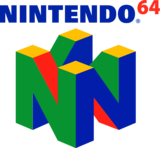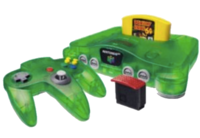Nintendo 64: Difference between revisions
(fix categories) |
(fix PS1 console link) |
||
| Line 16: | Line 16: | ||
==Development== | ==Development== | ||
Sony announced the [[PlayStation]], which was at the time a CD-ROM addon for the [[Super Nintendo Entertainment System]] at the Consumer Electronics Show in 1991. However, since the system would use a Sony-developed Super Disc format, Sony would have a large deal of control over the system. As a result, Nintendo tried to negotiate a better deal with Philips. This led to both deals falling through, and the add-on was never released. Philips released the [[CD-i]] in 1991, and Sony released the PlayStation as a stand-alone console in 1994. | Sony announced the [[PlayStation (video game console)|PlayStation]], which was at the time a CD-ROM addon for the [[Super Nintendo Entertainment System]] at the Consumer Electronics Show in 1991. However, since the system would use a Sony-developed Super Disc format, Sony would have a large deal of control over the system. As a result, Nintendo tried to negotiate a better deal with Philips. This led to both deals falling through, and the add-on was never released. Philips released the [[CD-i]] in 1991, and Sony released the PlayStation as a stand-alone console in 1994. | ||
[[File:forest-green-n64.png|left|200px]] | [[File:forest-green-n64.png|left|200px]] | ||
Latest revision as of 23:56, 15 June 2024

| |
| Nintendo 64 | |
| Designer | Nintendo R&D3 |
|---|---|
| Manufacturer | Nintendo |
| CPU | 93.75 MHz 64-bit NEC VR4300 |
| Graphics | 62.5 Mhz SGI RCP |
| Memory | 4MB |
| Media | Game Pak |
| Released | JP: June 23, 1996 NA: September 26, 1996 Brazil: September 29, 1996 EU/AU: March 1, 1997 |
| Added to Museum | January 20, 2018 |
The Nintendo 64, the fourth home video game console released by Nintendo, was preceded by the Super Nintendo Entertainment System. It was first released in 1996.
The GameCube, released in 2001, was the successor of the Nintendo 64.
Development
Sony announced the PlayStation, which was at the time a CD-ROM addon for the Super Nintendo Entertainment System at the Consumer Electronics Show in 1991. However, since the system would use a Sony-developed Super Disc format, Sony would have a large deal of control over the system. As a result, Nintendo tried to negotiate a better deal with Philips. This led to both deals falling through, and the add-on was never released. Philips released the CD-i in 1991, and Sony released the PlayStation as a stand-alone console in 1994.
In the meantime, Nintendo was working on their follow-up to the Super Nintendo Entertainment System. They opted to go with cartridges rather than CD-ROM media, as it would allow Nintendo to have more control over the production of games for the system. Cartridges would also allow games on the Nintendo 64 to load faster than the games on the systems by its competitors.
They marketed it as a 64-bit system to try to gain an edge on their competitors, but the lack of space when compared to competition hurt the system. As the cartridges were more expensive to produce than compact disc media,Nintendo also had a hard time getting third party support for their system. The Nintendo 64 went on to sell more units worldwide with 32.93 million units compared to the 9.26 million Saturn units that Sega sold. However, the Sony PlayStation outsold both systems combined with 102.49 million units.
Nintendo 64 games owned by WEC Museum
| Title | Developer | Released | Added to the Museum | Notes |
|---|---|---|---|---|
| Donkey Kong 64 | Rare | 1999 | January 20, 2018 | Bundled with the jungle green Nintendo 64 set. |
Emulated Nintendo 64 games owned by WEC Museum
| Title | Developer | Released | Added to the Museum | Notes |
|---|---|---|---|---|
| Blast Corps | Rare | 1997 | September 16, 2016 | The WEC Museum owns Rare Replay for Xbox One, in which the Nintendo 64 version is included. |
| Conker's Bad Fur Day | Rare | 2001 | September 16, 2016 | The WEC Museum owns Rare Replay for Xbox One, in which the Nintendo 64 version is included. |
| Dr. Mario 64 | Nintendo IRD | 2001 | July 13, 2018 | The WEC Museum owns the iQue Player, on which the Nintendo 64 version is included. |
| Jet Force Gemini | Rare | 1999 | September 16, 2016 | The WEC Museum owns Rare Replay for Xbox One, in which the Nintendo 64 version is included. |
| Killer Instinct Gold | Rare | 1996 | September 16, 2016 | The WEC Museum owns Rare Replay for Xbox One, in which the Nintendo 64 version is included. |
| Mario Kart 64 | Nintendo | 1996 | October 1, 2010 | The WEC Museum owns the Nintendo 64 version for the Wii Virtual Console. |
| Super Mario 64 | Nintendo EAD | 2007 | Wii: April 1, 2011 Switch: October 6, 2020 |
The WEC Museum owns the Nintendo 64 version for the Wii Virtual Console. The WEC Museum owns Super Mario 3D All-Stars for Nintendo Switch, on which the Nintendo 64 version is included. |
